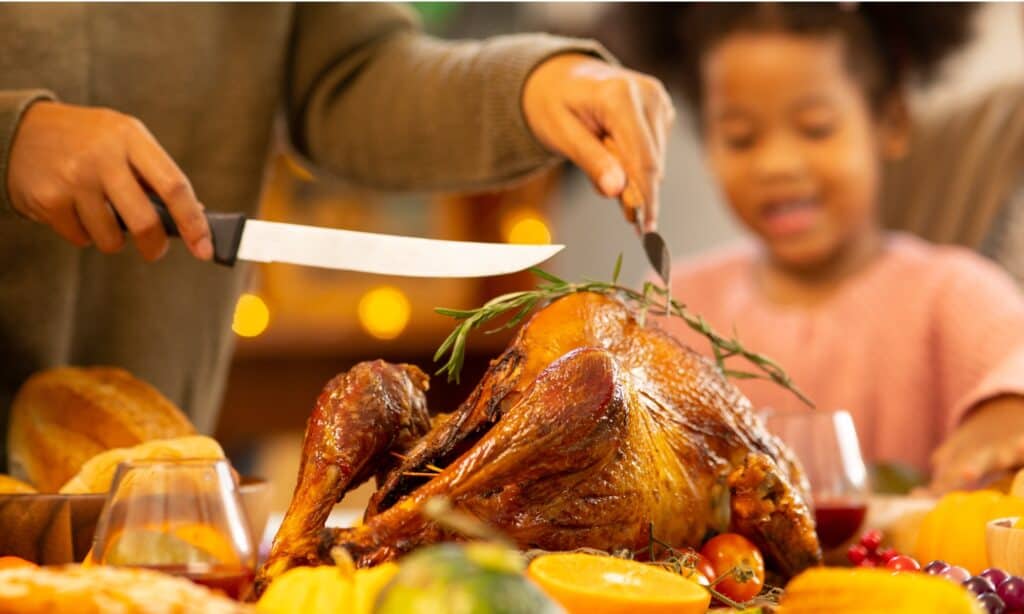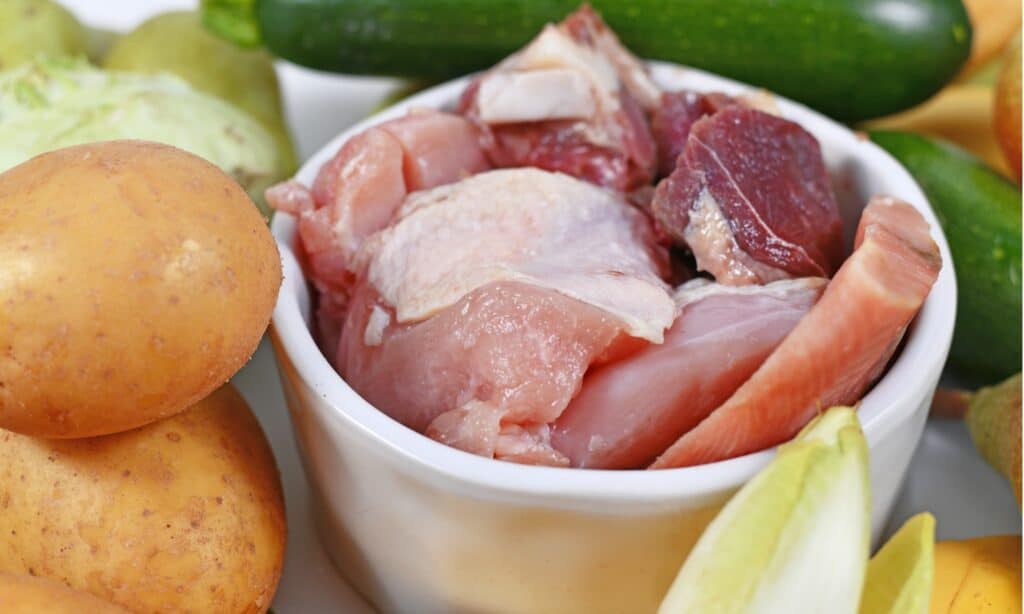Turkey is a staple food in America. It is the official meal of the thanksgiving holiday and it is eaten on so many other days by families all over the country. As a dog owner, giving your dog some of the turkey on your plate as a treat has properly crossed your mind at some points. However, before you do that, you should have an answer to the question “Can Dogs Eat Turkey Safely” first.
Whether you’re thinking of giving your canine companion a morsel from your plate, or you’re wondering if turkey would make a great treat to serve your pet, you should be aware of how safe or healthy feeding your pup turkey is, the risks involved and how to safely serve them a turkey treat. Read on to find answers to these questions and more.
Can Dogs Eat Turkey?
The answer to this question isn’t quite straightforward. It could be yes or no depending on the specific situation. Generally, turkey isn’t toxic to dogs which means it is safe to feed it to them. In fact, it is added to many commercial dog foods that are considered healthy for dogs because it is rich in protein, phosphorus, riboflavin, and other ingredients. It can also be served as a homemade treat for your dog too. As long as it is cooked well, without additives, and with the approval of a veterinarian, you have nothing to worry about.
Of course, this means there are instances where giving your pup some turkey isn’t a good idea. Thanksgiving turkeys for instance are cooked for humans and not for pets. This means they’re likely to contain additional ingredients that make them unsafe for pets. Some dogs may also be unable to eat turkey because of one health condition or the other.
When Turkey Is Bad for Dogs
So when is turkey bad for dogs? The answer to that depends on how the turkey is being prepared and the condition of your dog. The following are some of the instances where feeding turkey to your dog is a bad idea.

©iStock.com/pondsaksit
Raw Turkey
Raw turkey is not food for dogs. You may be tempted to toss some turkey parts to your dog while you’re cooking instead of simply disposing of them. But this is not a good idea. Raw meat is likely to contain bacteria like salmonella and several parasites that can make your dog sick. Dog parents should avoid offering their pets uncooked or undercooked turkey as this is unsafe for pets to eat.
Turkey Bones
Before serving your dog any meat, remove any bones from it. Bones from turkeys and other birds are particularly brittle. They’ll splinter into sharp tiny pieces very easily and these can cause serious injury to your dog’s mouth, throat, and digestive tract, leading to bleeding and pain. If you think it’s a good idea to give bones to your dog, a large hardy chew toy bone is a much better idea. Some of these are even turkey flavored and they’re completely safe for dogs.
Sliced Turkey/Deli Meat
Processed turkey and other meats are often made with extra spices and sodium. The quantity of these additives is usually too high for dogs. It is particularly problematic if your dog suffers from a health condition like pancreatitis
Seasoned & Marinated Turkey
The best way to serve turkey to dogs is to serve it plain and cooked. Seasoned or marinated turkey can be harmful to dogs. Typically, ingredients like onion, garlic, and seasonings that make food taste delicious to humans are toxic to dogs. Even small amounts of these can cause stomach upset and large amounts can make your dog extremely sick.
Too Much Turkey
Turkey should be eaten in moderation so you should watch out for how much of it your dog eats. An excess amount of turkey can hurt their digestive system. It also contains nutrients like fats that are not healthy when in excess.
How to Feed Turkey To Your Dog Safely?
So we have established that it is safe to feed turkey to your dog. However, it must be done under the right conditions. Here are some tips to keep in mind if you want to serve turkey to your dog as a treat:
Cook It Properly Without Spices Or Seasoning
Ideally, the best way to prepare turkey meant to be served to your dog is to boil it properly without adding seasoning or spices. This naturally means serving your dog leftovers from your own plate isn’t a good idea. Ingredients like garlic and onions should be completely avoided. You should be cautious with other addons as well. You may include vegetables like celery, carrots, and apples in moderate quantities for an additional source of nutrients. Just make sure the ingredients you add are safe for your dog as well.
Cut The Turkey Into Pieces And Remove The Bones
It makes sense to cut the turkey into small bite-sized pieces before serving it to your dog. You should also remove all the bones and skin on the turkey. Even if you have a large dog that might be able to chew the bones, it is best not to take that risk as turkey bones could cause a choking hazard or obstruct your dog’s intestines later. The skin also contains a lot of fat which makes it more harmful for dogs than the rest of the meat.

©iStock.com/Firn
What to Do If Your Dog Swipes Some Turkey
Dogs love food and they can be mischievous at times. Despite your best efforts to prevent it, there’s a chance that your dog will get a hold of turkey meat that wasn’t cooked for it. If your dog grabs a quick bite out of someone’s turkey on the dining table, you probably don’t need to worry or rush to a vet’s office right away.
Don’t panic or rush to snatch away the meat from your dog’s mouth. Some dogs are prone to aggressive behavior and it’ll harm you if you try to wrestle them for the meat. Unless there’s a case of allergy, eating a piece of turkey won’t harm your dog. Still, you have to watch out for symptoms of allergies, choking, or an obstruction in your dog’s gut especially if it ate a bone. Watch out for symptoms like lethargy, appetite loss, constipation, vomiting, bloody stool, restlessness, and so on. Contact your vet right away if you suspect something might be wrong.
Conclusion
Dogs are naturally carnivorous which means it is mostly safe to serve them meat like turkey. However, there are certain precautions to always keep in mind. Consult with a veterinarian before introducing any new food to your dog. This is particularly important if your dog is already on a restricted diet or it has an existing medical condition that can be exacerbated by the food it eats. Proper preparation is also necessary to ensure your dog is eating healthily and safely at all times.
The photo featured at the top of this post is © iStock.com/JasonOndreicka
Ready to discover the top 10 cutest dog breeds in the entire world?
How about the fastest dogs, the largest dogs and those that are -- quite frankly -- just the kindest dogs on the planet? Each day, AZ Animals sends out lists just like this to our thousands of email subscribers. And the best part? It's FREE. Join today by entering your email below.
Thank you for reading! Have some feedback for us? Contact the AZ Animals editorial team.






